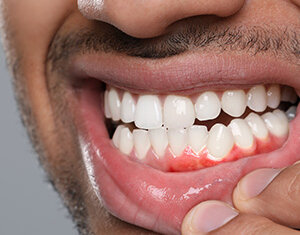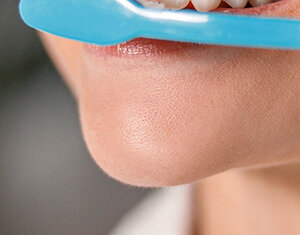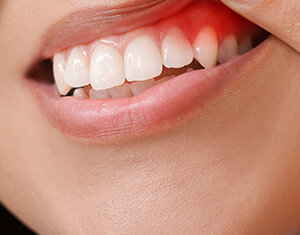Blog
The Effects Your Gums Have On Your Health
Oral Care

It is obvious that quality sleep, nutritious diet, regular exercise, and stress control are pivotal for health. However, gum health represents another key component of overall wellness that does not receive due attention. Gums serve vital functions, including holding teeth firmly and protecting them from decay and bacteria. Emerging research shows that gum condition connects with various aspects of overall health, including diabetes, heart health, respiratory function and more. Understanding the profound effects of gum health on the body allows informed daily choices to care for mouths in simple ways, benefiting the entire system. Let's explore this connection further.
The Link Between Unhealthy Gums and General Health:
Gum disease happens when bacteria in plaque causes inflammation under the gums, which can make you lose teeth if not treated. But get this - unhealthy gums impact your oral health more than your oral health. Studies connect gum disease to other health issues too!
The bacteria behind gum problems can spread in the blood, potentially hurting vital organs. Conditions like diabetes, heart disease, and breathing issues seem to be tied to gum disease. So caring for your gums helps your whole body, not just your smile! Switching to a special toothpaste for inflamed gums can reduce plaque, fight gingivitis, and heal receded gums.
How to Safeguard Yourself from Unhealthy Gums:
1. Regular Brushing
Brush twice daily using a soft toothbrush and gum-healthy toothpaste. This removes plaque that ruins teeth and gums. Carefully picking toothpaste is vital for gum problems.
2. Proper Flossing
Flossing daily may seem tedious, but taking a quick minute to remove plaque between teeth with minty string is essential for gum health. A toothbrush cannot reach all areas, leaving some buildup behind. Only focusing on brushing provides incomplete oral care, much like washing just half one’s face. Flossing cleans those unreached spots for full protection. Though it may seem inconvenient initially, making the effort to floss daily leads to improved gum health and cleaner teeth that dentists appreciate come check-up time.
3. Dental Check-ups
Get regular professional cleanings and check-ups. Dentists spot early build-up, so issues are treated quickly to keep gums healthy.
4. Healthy Diet
It is understandable that sweet snacks have appeal. However, making efforts to eat more fruits, vegetables, and whole grains has immense benefits for one's dental wellbeing. The abundant vitamins and minerals supplied in these wholesome options aid the mouth by stopping destructive bacteria from taking up residence along the gumline. Filling up on more natural, nutrient-dense foods supports oral health. A healthy diet leads to positive outcomes for both dental and overall well-being.
5. Hydration
Drink water daily to rinse food and bacteria, stopping gum problems before they start. Pick healthy toothpaste and stay hydrated.
6. Quit Smoking
Quitting smoking can be extremely difficult. However, it remains one of the most significant contributors to gum disease. The chemicals from cigarettes interact with existing bacteria in the mouth, creating a harmful environment for the gums. Kicking the habit helps strengthen gums again and boosts overall health - from heart to lungs. Those who smoke should consider discussing with their doctor as healthier gums can lead to improved wellbeing overall.
7. Limit Sugary Snacks
Cut back on sugary foods and drinks - they feed bacteria, causing gum issues. A thoughtful diet maintains healthy gums.
8. Use an Antiseptic Mouthwash
Adding an antiseptic mouthwash to one’s routine may seem an inconvenience initially. However, taking a minute to swish the antibacterial solution makes a meaningful difference for gum health. Mouthwash reaches bacteria that regular toothpaste often does not. The tingling sensation indicates it attacks germs that could eventually cause gum issues. Making this additional effort enhances gum protection and peace of mind about oral health.
9. Manage Stress
Try relaxing activities like yoga or meditation - chronic stress impacts gum health. Managing stress promotes oral wellness.
10. Monitor Medications
Watch for medication side effects on your gums. Talk to your doctor promptly about any oral changes for advice and adjustments. Pick healthy toothpaste and monitor meds.
11. Use a Soft Toothbrush
Choose a gentle, soft-bristled toothbrush and sensitive gum toothpaste. Brushing softly avoids hurting gums while cleaning correctly. Dabur Red Paste is one of the greatest options that you must choose.
12. Increase Vitamin C Intake
Get enough vitamin C if deficient - it causes gum issues. Vitamin C foods heal and stabilize loose teeth, promoting healthy gums.
Conclusion
Caring for your gums is vital for whole-body wellness. Seeing how oral and overall health connect allows better decisions. By focusing on good hygiene habits, regular dental visits, using sensitive toothpaste, and monitoring gum health, you support a bright smile and feeling your best long-term.
Disclaimer: The contents of this article are for informational purposes only and not a substitute for medical advice.
References
https://www.everydayhealth.com/periodontal-disease/what-gum-disease-can-mean-your-overall-
health
https://www.healthline.com/health/dental-and-oral-health/ways-to-keep-gums-healthy
https://www.kilgoredentalcare.com/ways-to-protect-yourself-from-gum-disease/























